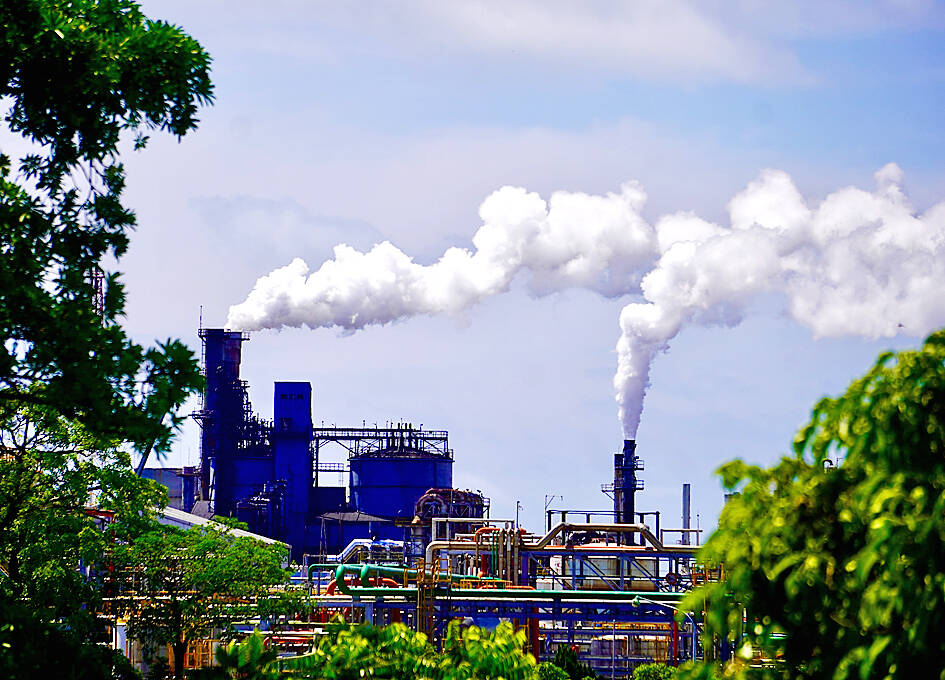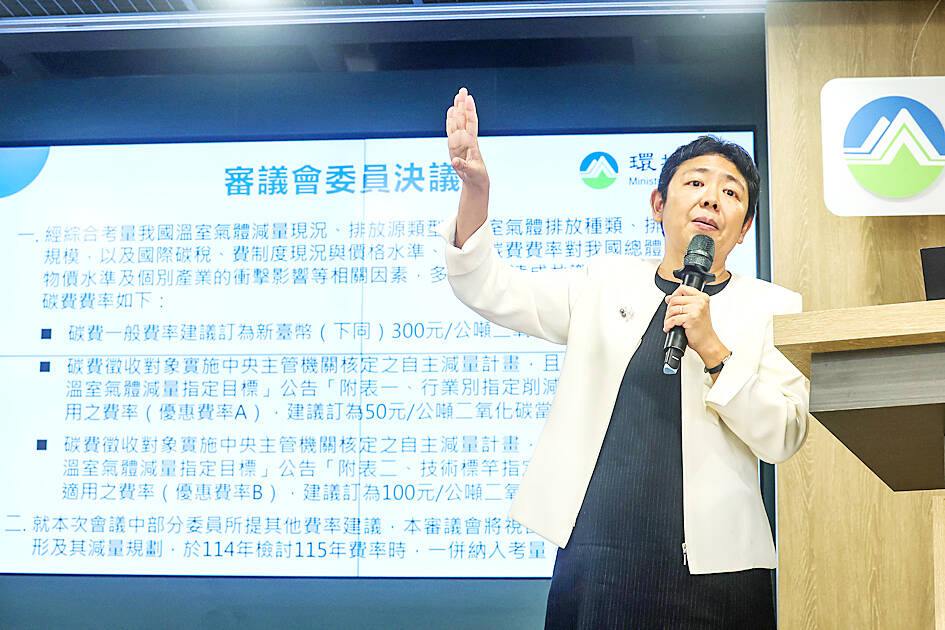A review committee established by the government yesterday recommended setting a basic carbon fee rate of NT$300 (US$9.34) per tonne of carbon emissions.
In addition to the basic rate, preferential rates of NT$50 and NT$100 per tonne were also recommended for companies that meet defined emissions reduction targets, the committee said.
The fees, to be applied initially only to companies emitting more than 25,000 tonnes per year, are expected to be collected starting in 2026, based on actual emissions next year.

Photo: CNA
Next year is to be used as a dry run in which large emitters would only have to report emissions amounts for this year, but would not have to pay carbon fees, the committee said.
The review committee issued its long-delayed recommendations — which still have to be approved by the Ministry of Environment — after reaching a consensus yesterday at its sixth meeting since March.
It had previously said it was considering a basic fee rate in the NT$300 to NT$500 range.

Photo: CNA
The ministry has said that about 500 emitters are expected to meet the 25,000 tonne threshold for paying a carbon fee.
At a meeting in July, the committee reviewed estimates that showed a carbon fee of NT$300 per tonne would lead to a 0.12 percentage point drop in GDP, while a NT$500 per tonne fee would cause a 0.2 percentage point fall.
Every 0.1 percentage point drop in GDP is equivalent to about NT$23.5 billion, based last year’s GDP, the ministry said.
Minister of Environment Peng Chi-ming (彭啟明) said that the ministry is in the process of discussing with relevant agencies the issue of demanding imports for products such as cement and steel to declare carbon dioxide emissions in a bid to protect domestic industry, adding that the plan might be implemented next year on a trial basis.
The ministry would also keep a close eye on details of the Carbon Border Adjustment Mechanism to be unveiled by the EU next year, he added.
Separately yesterday, the Ministry of Economic Affairs said that some local companies are bracing for a negative impact from the upcoming charges on carbon emissions as they are facing higher preferential rates than their Japanese or South Korean rivals.
The preferential charge of NT$100 per tonne is a heavier financial burden compared with their competitors, who are paying NT$64.7 per tonne imposed in Japan and NT$5.7 per tonne in South Korea, the economic affairs ministry said.
“Taiwanese exporters’ competitiveness should be considered,” the economic affairs ministry said.
What is more, as some local manufactures are grappling with losses, such a high levy would heap financial pressure on them, the economic affairs ministry added.
A total of 149 listed companies in the manufacturing sector require to pay the carbon fee, but 33 percent of them are even struggling to eke out a profit last year, it said.
To mitigate the impact, the administration suggested a lower rate between NT$50 and NT$70 in the initial stage, the economic affairs ministry said. The suggestion was denied.
In addition, it is a big challenge for most local businesses to hit their science-based-targets in the short term, if they seek to pay lower pricing as designed by the review committee, it said.
The economic affairs ministry would continue to urge the carbon fee review committee to lower the bar, it added.
As of the end of January, 42 local manufacturers’ carbon reduction targets received science-based-targets approval, mostly large companies such as Hon Hai Precision Industry Co (鴻海精密) and Delta Electronics Inc (台達電).
Additional reporting by Lisa Wang

ENDEAVOR MANTA: The ship is programmed to automatically return to its designated home port and would self-destruct if seized by another party The Endeavor Manta, Taiwan’s first military-specification uncrewed surface vehicle (USV) tailor-made to operate in the Taiwan Strait in a bid to bolster the nation’s asymmetric combat capabilities made its first appearance at Kaohsiung’s Singda Harbor yesterday. Taking inspiration from Ukraine’s navy, which is using USVs to force Russia’s Black Sea fleet to take shelter within its own ports, CSBC Taiwan (台灣國際造船) established a research and development unit on USVs last year, CSBC chairman Huang Cheng-hung (黃正弘) said. With the exception of the satellite guidance system and the outboard motors — which were purchased from foreign companies that were not affiliated with Chinese-funded

PERMIT REVOKED: The influencer at a news conference said the National Immigration Agency was infringing on human rights and persecuting Chinese spouses Chinese influencer “Yaya in Taiwan” (亞亞在台灣) yesterday evening voluntarily left Taiwan, despite saying yesterday morning that she had “no intention” of leaving after her residence permit was revoked over her comments on Taiwan being “unified” with China by military force. The Ministry of the Interior yesterday had said that it could forcibly deport the influencer at midnight, but was considering taking a more flexible approach and beginning procedures this morning. The influencer, whose given name is Liu Zhenya (劉振亞), departed on a 8:45pm flight from Taipei International Airport (Songshan airport) to Fuzhou, China. Liu held a news conference at the airport at 7pm,

Authorities yesterday elaborated on the rules governing Employment Gold Cards after a US cardholder was barred from entering Taiwan for six years after working without a permit during a 2023 visit. American YouTuber LeLe Farley was barred after already being approved for an Employment Gold Card, he said in a video published on his channel on Saturday. Farley, who has more than 420,000 subscribers on his YouTube channel, was approved for his Gold Card last month, but was told at a check-in counter at the Los Angeles International Airport that he could not enter Taiwan. That was because he previously participated in two

SECURITY RISK: If there is a conflict between China and Taiwan, ‘there would likely be significant consequences to global economic and security interests,’ it said China remains the top military and cyber threat to the US and continues to make progress on capabilities to seize Taiwan, a report by US intelligence agencies said on Tuesday. The report provides an overview of the “collective insights” of top US intelligence agencies about the security threats to the US posed by foreign nations and criminal organizations. In its Annual Threat Assessment, the agencies divided threats facing the US into two broad categories, “nonstate transnational criminals and terrorists” and “major state actors,” with China, Russia, Iran and North Korea named. Of those countries, “China presents the most comprehensive and robust military threat